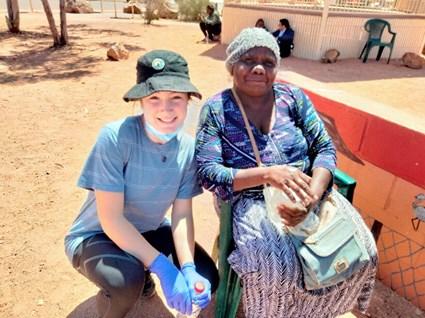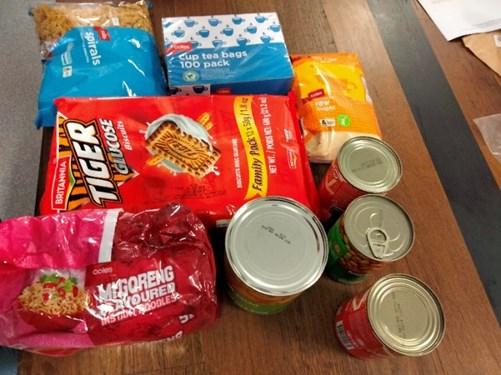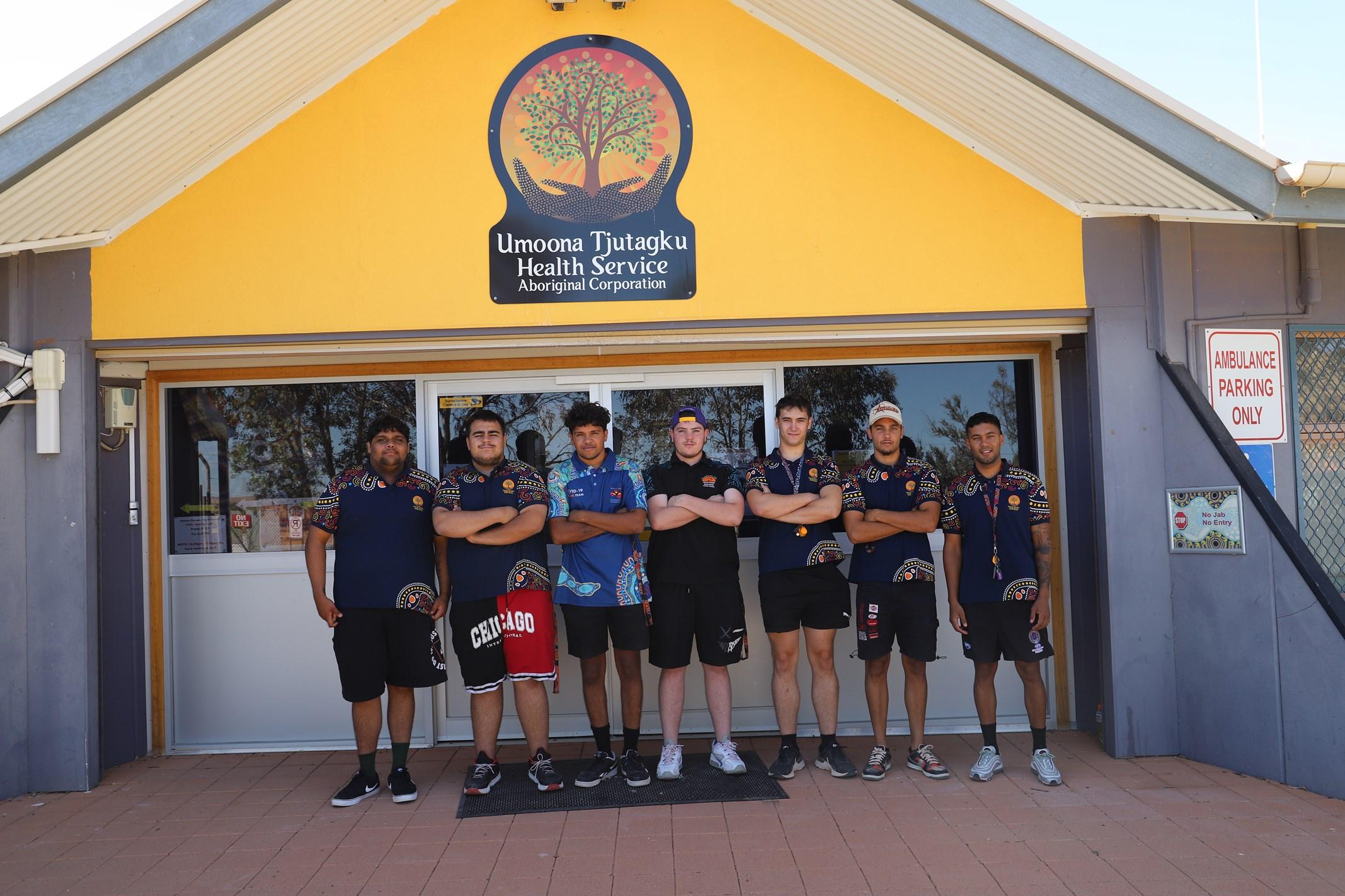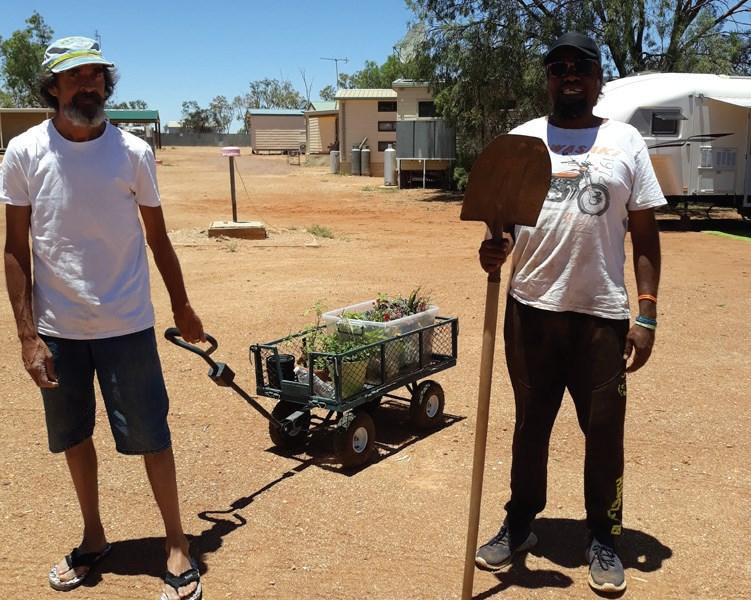
















As I write this article, SA was having their fourth wave of COVID infections. In order to continually be ready, ongoing new training and refreshers have to be done to help ensure community and staff safety. Our Staff have completed their hand hygiene training, which is how to clean your hands to make sure all the bacteria and viruses are removed from your hands so that you cannot infect others. Community members are also encouraged to do hand hygiene before they touch things in public places and after touching things other people could have touched particularly in public places.
This week it was the donning (putting on) and doffing (taking off) of PPE (Personal Protective Equipment). For health workers this consists of the N95 masks (highly protective masks), the gloves, the gown and eye protection. Appropriate putting on and taking off of these PPE reduces the chances of infecting clients and also protects the workers.

Alcohol and Other Drug Social Workers conduct outreach programs evidence-based harm reduction approach that aims to provide care and support to Aboriginal Peoples in the community. This program focuses on ongoing support and treatment services based on their concerns in regard to Alcohol and Other Drugs, homelessness, housing support, emotional support, and other support services.


During our ICE workshops, all the social workers get a chance to build up a rapport with clients to find out the symptoms of ICE. It is difficult to find out whether clients are using Meth or not so the ICE workshop assists social workers to know more about clients. This program conducts educational sessions by conducting education activities to provide knowledge regarding side effects, symptoms, long-term impacts, and short-term impacts of ICE and other drugs. In this workshop school children from Adelaide participated and learn about history and culture of Aboriginal Peoples. They learn the way social workers engaged with the community in rural areas by Yarning.





Residential rehabilitation centres (‘rehabs’) provide a supportive treatment environment where people can live for a while to work on their issues with alcohol and other drugs. These rehabs provide a different range of services in an environment where alcohol and other drugs are restricted and they support clients to skill development or to excel in their existing skills such as (parenting skills, sewing, living skills, or managing finances).
Accessing Rehabilitation services is one of the biggest challenges for Aboriginal Peoples in the community due to stigma and shame. Stigma and shame come such as identifying Aboriginal and Torres Strait Islander Peoples is a source of pride but being addicted to drugs or alcohol or other challenges in life such as unemployment or homelessness. However, the AOD team follows motivational interviewing steps such as precontemplation, contemplation, preparation, action, and maintenance to change the mind of the clients by maintaining their confidentiality and privacy.
The AOD team puts the interest of our clients first. These rehabs provide similar services to other, however, also focus on providing a culturally safe and appropriate environment for clients. When a client makes up their mind to go for rehab then AOD social workers work collaboratively with the client and assist the client to find out the best rehab according to their needs. For example, we ask a few questions such as what are your goals. What do you want to achieve in rehabilitation? If there is a cost can you afford it? And many more questions.
Footsteps rehabilitation in Port Augusta supports our client through interventions which include:
• screening and brief interventions in primary health care, sobering up services, after health care community and workplace settings
• acute, intensive interventions such as withdrawal management in medical inpatient settings
• short to long-term counselling and case management in community settings
• relapse prevention such as peer support groups and mentoring provided in a community setting


• medium to long-term, intensive residential rehabilitation services
• medication-assisted treatment for opioid and alcohol dependence.
Umoona Tjutagku supports compliant clients to complete their rehabilitation journey who attends AOD counseling sessions, and programs, and are engaged with the AOD team regularly. AOD teamwork on the ground to change the mind of their clients by standing with clients and for the clients. UTHSAC is a motivation to support clients with various daily living necessities such as food, medication, hygiene products, etc.

We are committed to improving the oral health of Aboriginal people in Coober Pedy. We provide dental care for eligible Aboriginal people at dental clinics in metro and country South Australia.

Umoona Tjutagku Health Service was visited by SA Dental and Dietician/Diabetes educator late November 2022.
Many of the chronic illnesses that disproportionately affect the Aboriginal population are also linked to dental health.
SA Dental team and the dietician wanted to get out into the Coober Pedy community and provide clients with prevention and information, giving out tooth brushes, tooth paste and easy to read flyers on proper brushing techniques and healthy eating. The community was welcoming and receptive and engaging with the team, eager to learn about dental health and healthy eating.
Eligible Aboriginal adults can access FREE priority general and emergency dental care at our clinics.


To be eligible clients need to be:
Aboriginal and/or Torres Strait Islander.
the holder of a current Centrelink Concession Card. aged 18 years and older. Wider Community if you require emergency care please see our nurse for a referral and an appointment. Emergency and general dental care is FREE through the program. There may be fees for some specialist services. Any payments required will be discussed at the time of treatment.


On the 17th of November, we hosted a Children’s Health Check Program at the Healthy for Life Building. Staff from the health clinic and the Drug and Alcohol service came together to bring the day to life and it was a big success!
We had an amazing turnout with many families coming through the doors for a fun-filled day with lots of activities and educational opportunities for both the children and their mothers/carers.
The aim of this program was to promote the health and wellbeing of Aboriginal children within Coober Pedy. Areas we focused on included dental hygiene, ear health and healthy eating. All children and their mothers were able to receive a full health check with both the nurses and the GP.


We had a bouncy castle for the kids, a hairdresser for the mums and a range of food options including a BBQ available for all that attended. Children also received a gift bag at the end of the day which included toys, brochures, bubbles and healthy items such as toothbrushes and toothpaste.
Overall, it was a great turnout and we are privileged that we have been able to contribute to the promotion of health and wellbeing of Aboriginal Children and their mums within the Coober Pedy community. We will continue to use the Healthy for Life building for future programs to promote the health and wellbeing of Aboriginal children and mothers in Coober Pedy.




The aboriginal health worker (AHW) workforce is the cornerstone to providing culturally safe primary health care for Indigenous peoples and communities. A growing body of evidence suggests that the holistic and context-adapted strategies to improving service delivery employed by this unique workforce leads to improved outcomes for Indigenous peoples in a variety of clinical and social areas, such as chronic disease management, prevention, and health promotion.
Umoona Tjutagku Health Service are working to increase the number of Aboriginal and Torres Strait Islander health professionals working in our sector. This improves access to culturally safe treatment for Aboriginal and Torres Strait Islander people.
Aboriginal and Torres Strait Islander Health Workers and Health Practitioners play an important role in reducing anxiety and improving the quality of communication for Aboriginal and Torres Strait Islander clients through cultural brokerage. They assist general practitioners (GPs) and Registered Nurses to better understand and respond to clients’ concerns, and help clients to better understand their illness and treatment. Jonte, Zac, Rameth, Christopher and Kym currently work in with thin the clinical team. Whilst Peter and N’Ky work alongside the Drug and alcohol team. In 2023 the young Health Workers will start their Aboriginal health worker Certificate, whilst we also encourage that they take on further training at University in Adelaide to be upcoming allied health practitioners. This is very exciting for Umoona Tjutagku Health Service in providing better care for our community and seeing new young school leavers doing something great in the community.






The health of the Aboriginal individual and whole community is defined in a holistic way as social, emotional, spiritual and cultural wellbeing. UTHS DAS arranged various programs aligned with their needs and beliefs to promote mental social and physical health.




With Covid19 in Back drop and demanding everyone’s attention, some of really important health issues and tests has been forgotten or put off. Cancer Screening is one such important, neglected arena that needs to be revived.
So much so that it needs to be incorporated into our general health routine, same as checking on for high cholesterol, for Diabetes, for anemia etc. Getting screened for certain types of Cancer has become easier and user friendly than ever before.
Screening can find cancers long before any symptoms appear and detect changes in cells before they becomes cancerous. Therefore better chance of treatment and survival for that person.
Screening can identify infections that cause cancer in the future. But Regular screening may be needed.
Though there are set time intervals for certain screening programs, if you are worried of a symptoms of a disease, please see a doctor/ health professional for additional tests.
Breast screen Australia Program – chance of a woman developing breast cancer is one in eight. Approximately 17000 women are diagnosed with breast cancer annually. The screening for breast cancer is Mammogram which is a low dose X ’ray on woman’s breast. All women aged 5074 are encouraged to have free mammogram every two years through Breast Screen Australia.
National bowel Cancer screening program- Second most common cancer in Australia. Around 14000 new cases of bowel cancer are diagnosed each year in Australia.it is detected by FOBT [fecal occult blood test] s simple that can be done at home and looks for hidden traces of blood in bowel motion. It’s offered free to all aged 50-74 years, every two years. A further investigation, usually colonoscopy is needed to establish the cause, if FOBT find traces of blood.
National Cervical screening Program- The incidence of cervical cancer have halved in Australia since the introduction of screening program. Today women from age 25 can choose to collect a sample themselves under supervision which is effective at detecting HPV [human Papilloma Virus]. This needs to be done every 2 years.
Cancer screening results of both bowel and cervical are reported and recorded in our National Cancer Screening Register. This helps us to check on when the next screening test is due. Though these are the major population based screening programs happening nationally, there are other types of cancer screening which run on demand.
Lung Cancer screening, Prostate Cancer screening, Skin Cancer screening, Ovarian Cancer screening to name a few.
“I am hoping my choice in Cancer screening allow me to live longer and healthier – Angelina Jolie” A quote by this famous Hollywood actress explains it all. A quote by this famous Hollywood actress explains it all.
Yesterday is history, today is a gift, tomorrow is a mystery


This is Darryl Braund, the new Substance Misuse Worker in Oodnadatta. Prior to recently starting this position, he has been living here in a caravan with his wife for 7 months, slowly getting to know the community through volunteer work - mostly gardening, arts and aged care. He grew up in regional SA and have lived in every state of Australia, and tried a variety of jobs. He also has 40 years of live experience and recovery from AOD addictions, and subsequent training in Disability Work, Pastoral Care, Mental Health, and Art therapy.

In this position I am to continuing to build relationships, trust and hope for a holistically healthier future for the Dunjiba Community. This will be enhanced by working more closely with the DAS team, using more Arts for expression, and encouraging unity, and promoting inter-agency collaboration that creates activities and services for social and cultural health. We have had some positive steps made in this direction already: mentoring a client to get a job and planning a men’s camp - both with Bungala Aged Care, and during our recent NAIDOC celebrations UTHS sponsored a BBQ, arts, and movie activity at the Town Hall, which included four successful boomerang-making workshops and we also supported other community agency’s activities throughout the week, in collaboration with Dunjiba Council.








Why we are doing NIAS (National Ice Action Strategy) awareness programs? Prevention is proven and Cost-Effective Evidence-based prevention programs can dramatically reduce rates of substance use. Australian Governments are committed to reducing the harm methamphetamine can cause to communities, families, and individuals. NIAS social worker and other social worker’s team provide friendly service to the community, offer information, facilitate a person -centred recovery plan through interactive approaches, help increase knowledge, skills, or awareness, or alter perceptions in order to reduce harmful and outcomes.

Inform, educate, perform, model and lead to ensure diversity is Create & sustain an environment that actively embraces diversity actions and decisions impacting the achievements of UTHSAC provider and the employer of choice as we lead our community to
Innovative, responsive and culturally appropriate health services are accessible to Aboriginal people living in the Coober Pedy and surrounding region.



To provide a holistic health care service that achieves positive health outcomes through primary health care intervention as well as safer communities through prevention and education.

Hey All On behalf of Umoona Tjutagku CEO, staff and Board we would like to wish you all a very merry Christmas and a happy new year.




During this time if you have cold like symptoms please call the main office and let the health worker know of your symptoms and concerns. Please stay home and isolate until nurse and health worker visit you to do a COVID test. If you require anything else from the clinic please call the clinic first.
Please stay safe during the Christmas Break see you all next year.